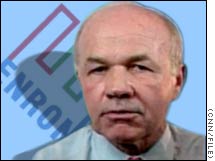|
Lay's death throws wrench into civil claims Enron founder Kenneth Lay's sudden death could make it tough for the government and civil lawsuits to get the money they've been seeking. NEW YORK (CNNMoney.com) -- Enron founder Kenneth Lay, the man vilified as the personification of corporate malfeasance, proved he was a mere mortal after all. But Lay's death of a heart attack early Wednesday morning has left a cloud of uncertainty as government officials and plaintiffs attorneys all contemplate how to go after Lay's dwindling estate.
The main issue surrounds Lay's conviction of 10 counts of conspiracy and fraud. Because Lay died before he had the chance to appeal, not only does his conviction get thrown out under a legal doctrine called abatement, but it is now as if he had never been indicted in the first place. And without a conviction, the government is going to have a hard time recouping any financial restitution from Lay or his estate. "It's difficult, if not impossible, to base an order of restitution and forfeiture on a conviction that no longer exists," said Michael Wynne, attorney at Houston-based Yetter & Warden. "The purpose of criminal law is to punish people, and it's impossible to punish a person that's dead." Before Lay's death, government attorneys as well as those attorneys pressing civil lawsuits against Lay and Enron's former chief executive Jeffrey Skilling were mounting an aggressive attack against the two men convicted of fraud and conspiracy. While civil complaints call for unspecified millions of dollars from Lay and Skilling, on June 30 the government filed a motion to seize a total of $182.8 from the convicted executives. According to court documents, the government is seeking to retrieve $43.5 million of that amount from Lay. Separately, the government's motion also asked the courts to order that Lay forfeit $6.3 million he had in an a Goldman Sachs account, and the posh Houston condo worth at least $1.5 million that both he and his wife, Linda, lived in. Legal experts said the government can still pursue civil forfeiture proceedings and that civil litigants can still launch a legal battle against Lay's family and estate. But without Lay's conviction as proof in their case, plaintiffs are facing some challenges. For instance, if a defendant is deceased, civil claimants can't seek punitive damages, according to Joel Androphy, partner at Houston-based law firm Berg & Androphy. Any civil lawsuits would have to be limited to compensatory damages, or those losses that were actually incurred by an individual, he said. Lawyers who were taking aim at Lay are now reassessing their options. "We will have to evaluate what the financial circumstances are in light of this tragedy," said Justin Campbell, a partner at Campbell Harrison and Dagley LLP who represents participants in Enron's 401(k) plan in their lawsuit against Lay and Skilling. And that's where it gets tricky. Lay's dwindling estate Lay, who was once worth hundreds of millions of dollars, testified during the Enron trial that he was $250,000 in the red because most of his net worth was tied up in worthless Enron stock. He added that legal bills ate up the rest of his fortune, and that he still owed millions to his attorneys. And Lay's death could make it harder for civil claimants to go after his home because under the Homestead Act, his home is protected from seizure if it's the primary residence of his widow. "You can put together an argument to proceed against the property of a deceased person," said Scott Meyers, chairman of the litigation practice group at Chicago-based law firm Levenfeld Pearlstein LLC. "There is a recognition that a spouse can't profit from the wrongful conduct of his or her spouse, (but) the wife is an innocent party in this case." From the government's standpoint, Meyers said it may not be cost effective to mount a large-scale effort to recoup assets from Lay's family - and it could be a public relations disaster. "They would go from punishing the bad guy to beating up on his wife," he said. The Department of Justice declined to comment on any decision it has made related to whether it will pursue its motion for forfeiture. But the Securities and Exchange Commission, which sought $90 million in damages from Lay, said that in civil trials against the deceased, anything considered to be "ill gotten gains," will still be pursued on behalf of investors. And legal experts expect that the attorneys in the civil cases are working hard to find creative arguments with which to continue their battle to recoup investor losses. With Lay out of the picture, legal observers also said that plaintiffs will likely go after Skilling even more aggressively. "In the public's perception, Skilling will be the new face of Enron," said Yetter & Warden's Wynne. "He's the last guy standing." --------------------------------------------------------------------------- Related: Enron on trial |
|

